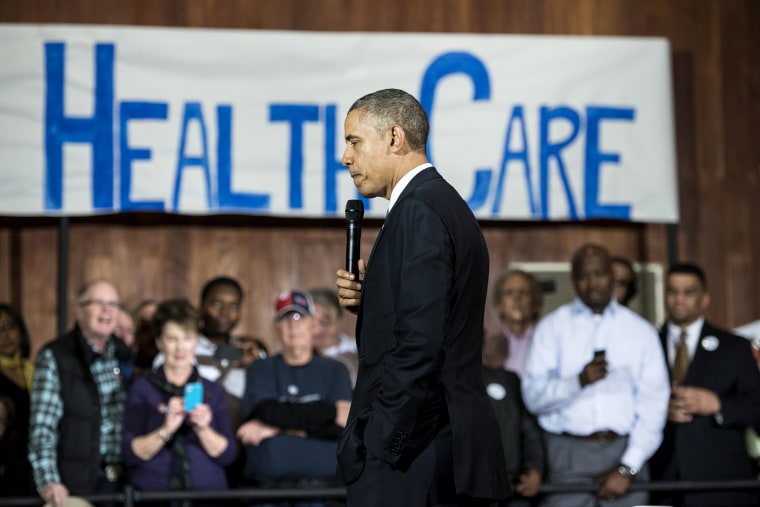It was just a few months ago that the political world took solace in a few obvious facts. The Affordable Care Act was failing; it stood no chance of meeting its enrollment projections; and Republicans would use "Obamacare" as a cudgel for the rest of the year, beating Democrats who would no doubt try to change the subject.
That was then; this is now. All of a sudden, the ACA looks like a great success; the system has already exceeded its enrollment projections; and Democrats are suddenly willing to take the offensive on the issue they were supposed to avoid. The
Wall Street Journal reports today that some Dems have even begun "attacking Republicans" for trying to repeal "popular benefits of the law."
Not long ago, many Democrats were in a defensive crouch when it came to health care, amid public anger about the botched rollout of the federal website to sign up for insurance and stories of people who lost existing coverage because it didn't meet federal standards. Many focused on fixes they said should be made to the law rather than trying to convince voters of its benefits. Now, in at least half a dozen competitive Senate and gubernatorial races, Democrats and their allies are airing TV commercials that directly support the legislation, focusing on its guaranteed coverage for pre-existing conditions, preventive-care benefits and a ban on charging women more for insurance. In some cases, the ads talk up how the Democrat candidate has worked to guarantee these benefits; in others, they attack a Republican for wanting to take them away.
This was largely unimaginable last fall. The very idea that Democrats would put Republicans on the defensive by condemning the GOP's repeal efforts just didn't seem like a feasible political strategy.
And yet, here we are.
As for Republicans, who seem far more eager to talk about the 2012 attack in Benghazi than health care policy, the midterm strategy appears to have fallen apart.
Indeed, when President Obama nominated Sylvia Burwell to succeed Kathleen Sebelius as Secretary of Health and Human Services, many on the right thought this would be a terrific opportunity to create a high-profile forum to complain incessantly about the ACA.
The fight never materialized and Burwell is on track for confirmation without a scratch.
So what are we left with? Polls show repeal is far less popular than the law itself; high-profile Republicans are trying to argue that some popular benefits will remain intact no matter who wins upcoming elections; and some GOP governors who swore to oppose "Obamacare" in every possible instance are
suddenly warming up to Medicaid expansion.
It's against this backdrop that House Speaker John Boehner (R-Ohio) recently conceded that repealing the Affordable Care Act "
isn't the answer."
Greg Sargent
added this morning:
...Republicans are slowly evolving in their approach to the politics of the law, opting for a more ”nuanced” strategy that doesn't place repeal front and center anymore. As GOP pollster Bill McInturff puts it, Republicans will need to "have a bill of particulars about what hasn't worked." That is a polite way of saying that the GOP strategy to date — vow to repeal Obamacare and mumble platitudes about replacing it with something or other that does all the things in it that people like – is a bust.
On the left, meanwhile, the Service Employees International Union, the Planned Parenthood Action Fund, and MoveOn.org
have "plans to spend tens of millions of dollars persuading residents in a dozen key states to vote for Democrats based on" health care reform.
The repeal crusade is over. The right lost. It's heartening to see the conventional wisdom start to catch up.
